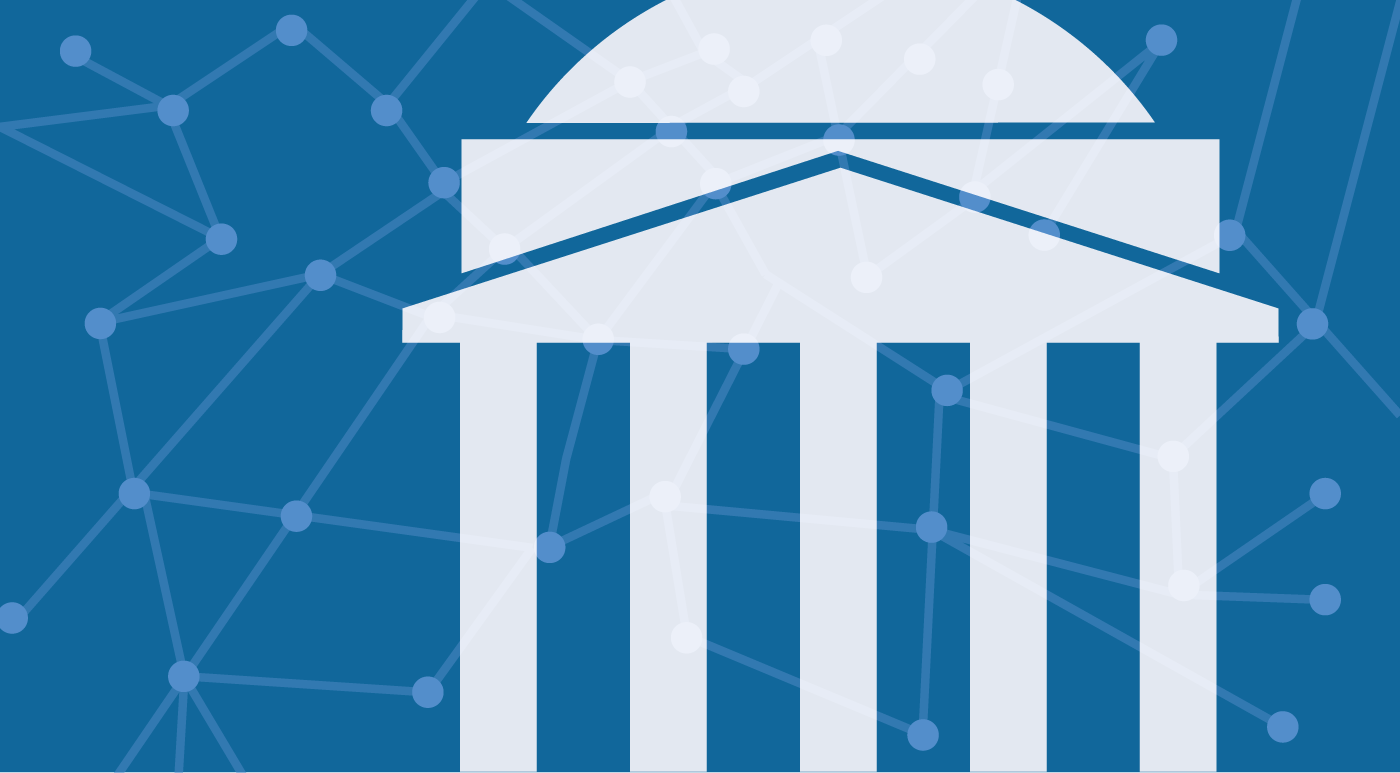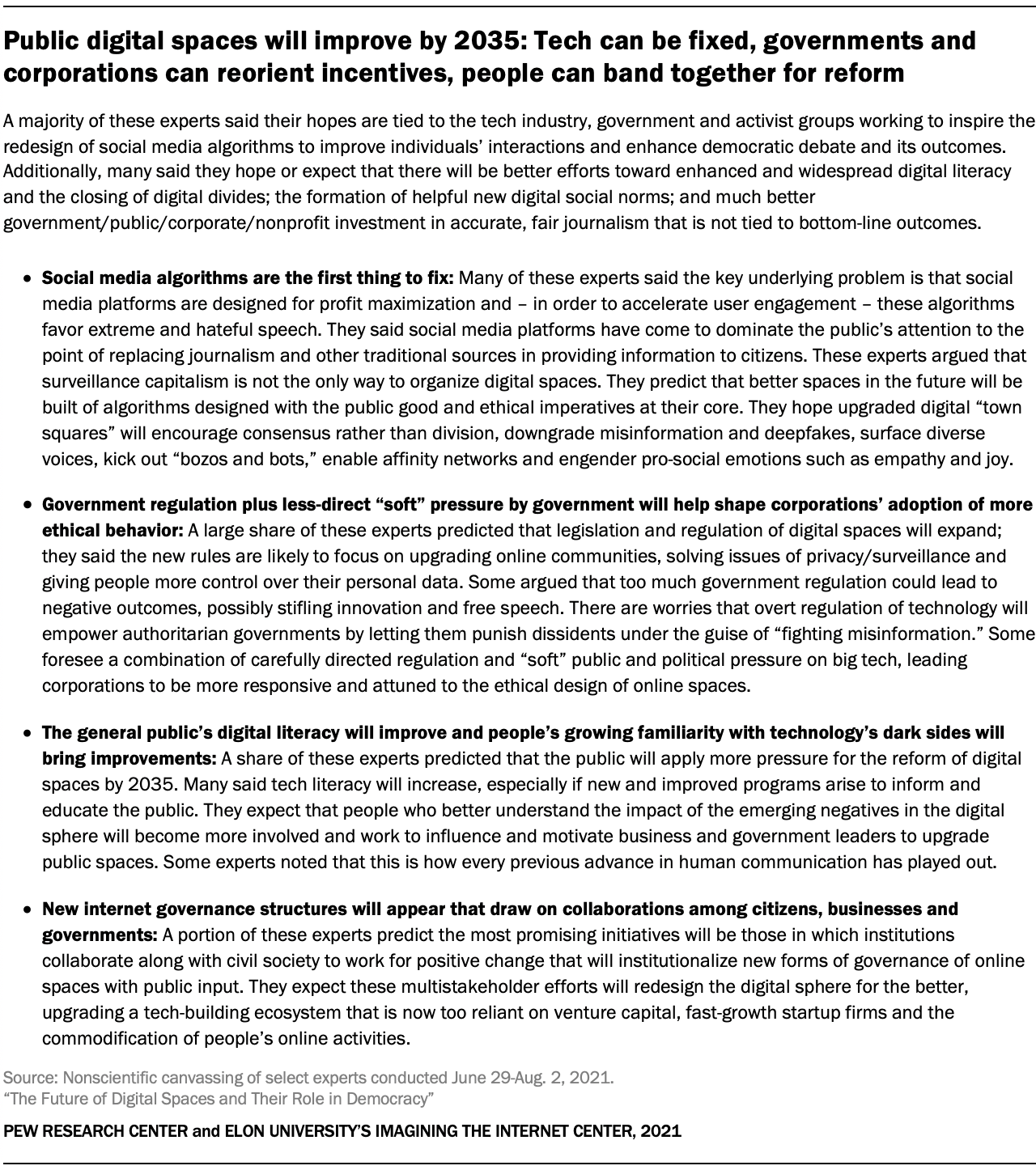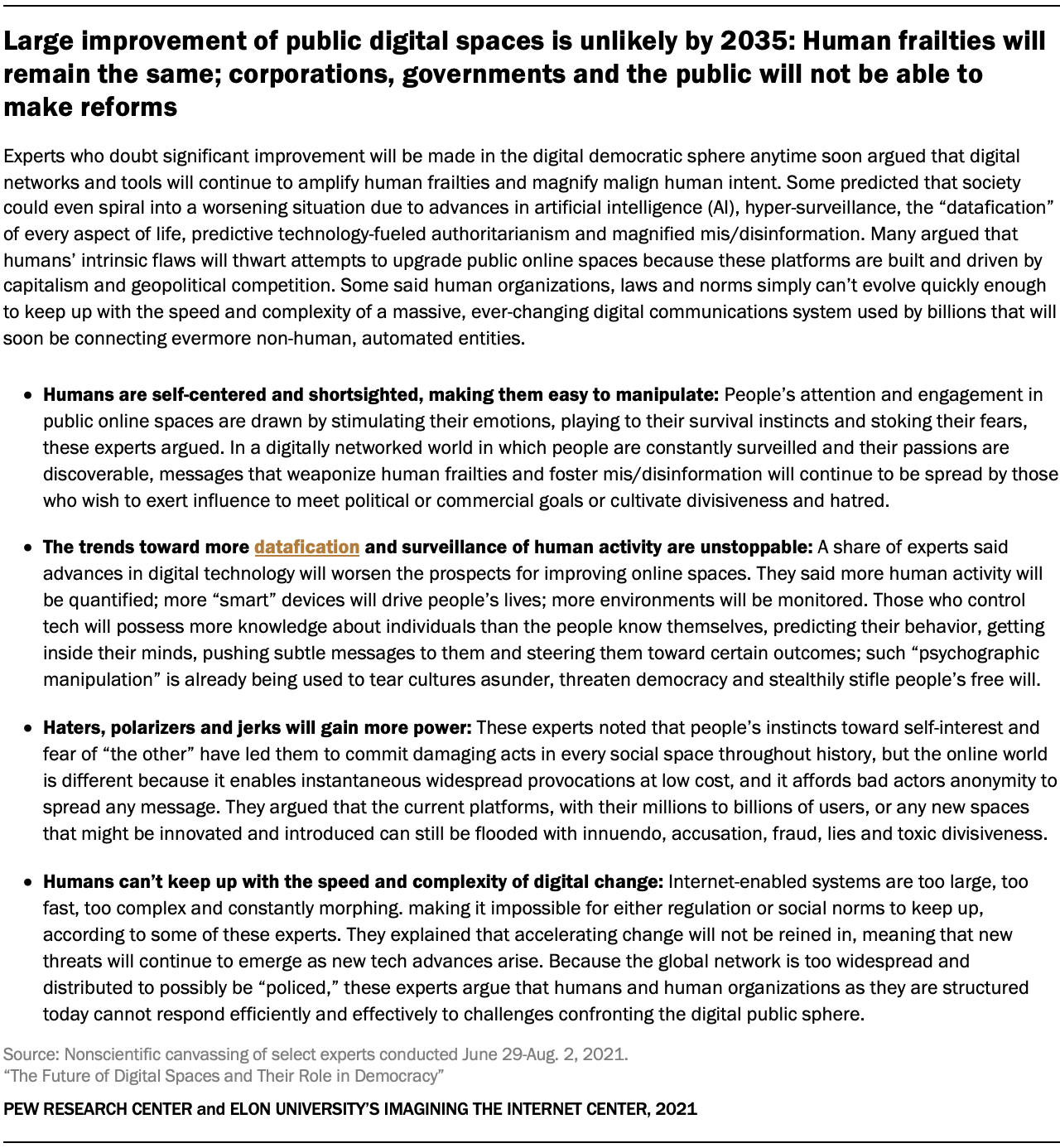Many experts say public online spaces will significantly improve by 2035 if reformers, big technology firms, governments and activists tackle the problems created by misinformation, disinformation and toxic discourse. Others expect continuing troubles as digital tools and forums are used to exploit people’s frailties, stoke their rage and drive them apart

This is the 13th “Future of the Internet” canvassing Pew Research Center and Elon University’s Imagining the Internet Center have conducted together to gather expert views about important digital issues. In this report, the questions focused on the prospects for improvements in the tone and activities of the digital public sphere by 2035. This is a nonscientific canvassing based on a nonrandom sample; this broad array of opinions about where current trends may lead in the next decade represents only the points of view of the individuals who responded to the queries. Pew Research Center and Elon’s Imagining the Internet Center built a database of experts to canvass from a wide range of fields, inviting professionals and policy people based in government bodies, nonprofits and foundations, technology businesses and think tanks, as well as interested academics and technology innovators. The predictions reported here came in response to a set of questions in an online canvassing conducted between June 29 and Aug. 2, 2021. In all, 862 technology innovators and developers, business and policy leaders, researchers and activists responded to at least one of the questions covered in this report. More on the methodology underlying this canvassing and the participants can be found in the section titled “About this canvassing of experts.”
Those who worry about the future of democracy focus a lot of their anxiety on the way that the things that happen in online public spaces are harming deliberation and the fabric of society. To be sure, billions of users appreciate what the internet does for them. But the climate in some segments of social media and other online spaces has been called a “dumpster fire” of venom, misinformation, conspiracy theories and goads to violence.
Social media platforms are drawing fire for their role in all of this. After the Jan. 6, 2021, attack on the U.S. Capitol, a congressional panel requested that Facebook, Google, Twitter, Parler, 4chan, Twitch and TikTok release all records related to misinformation around the 2020 election, including efforts to influence or overturn the presidential election results. In September 2021, a five-part series in The Wall Street Journal exposed details that seem to show that Facebook has allowed the diffusion of misinformation, disinformation and toxicity that has resulted in ethnic violence and harm to teenage girls and has undermined COVID-19 vaccination efforts. And The Journal’s source, Facebook whistleblower Frances Haugen, followed up by telling the U.S. Senate that she had gone public with her explosive material “because I believe that Facebook’s products harm children, stoke division and weaken our democracy.”
Worries over the rise in the acrid tone and harmful and manipulative interactions in some online spaces, and concerns over the role of technology firms in all of this, have spawned efforts by tech activists to try to redesign online spaces in ways that facilitate debate, enhance civility and provide personal security. A selection of these initiatives were described in a spring 2021 article in The Atlantic Monthly by Anne Applebaum and Peter Pomerantsev. Among the suggested solutions documented in the piece:
- The creation of an internet version of public media along the lines of PBS and NPR;
- “Middleware” that could allow people to set an algorithm to give them the kind of internet experience they want, perhaps without the dystopian side effects;
- Online upvoting systems that favor content that could push partisans toward consensus, rather than polarizing them;
- An internet “bill of rights” allowing “self-sovereign identity” that lets people stay anonymous online, but weeds out bots; and
- “Constructive communication” systems set up to dial down anger and bridge divides.
In light of the current conversations about the need to rethink and redesign online public spaces, Pew Research Center and Elon University’s Imagining the Internet Center asked experts how they expect the digital public sphere to evolve by 2035. Some 862 technology innovators, developers, business and policy leaders, researchers and activists responded to this specific question:
Looking ahead to 2035, will digital spaces and people’s use of them be changed in ways that significantly serve the public good?
Some 61% chose the option declaring that, “yes,” by 2035, digital spaces and people’s uses of them will change in ways that significantly serve the public good; 39% chose the “no” option, positing that by 2035, digital spaces and people’s uses of them will not change in ways that significantly serve the public good.
It is important to note that a large share of who chose “yes” – that online public spaces would improve by 2035 – also wrote in their answers that the changes between now and then could go either way. They often listed one or more difficult hurdles to overcome before that outcome can be achieved. Thus, the numeric findings reported here are not fully indicative of the troubles that they think lie between now and 2035.
In fact, in answer to a separate question in which they were asked how they see digital spaces generally evolving now, a majority (70%), said current technological evolution has both positives and negatives, 18% said digital spaces are evolving in a mostly negative way that is likely to lead to a worse future for society, 10% said the online world is evolving in a mostly positive way that is likely to lead to a better society, and about 3% said digital spaces are not evolving in one direction or another.
It is also worth noting that the responses were gathered in mid-summer of 2021. People’s responses came in the cultural context of the ongoing COVID-19 pandemic, and at a time when rising concerns over climate change, racial justice and social inequality were particularly prominent – and half a year after the Jan. 6, 2021, attack at the U.S. Capitol in the aftermath of one of the most highly contentious U.S. presidential elections in recent history.
This is a nonscientific canvassing, based on a nonrandom sample. The results represent only the opinions of the individuals who responded to the queries and are not projectable to any other population.
The bulk of this report covers these experts’ written answers explaining their responses to our questions. They sounded many broad themes in sharing their insights about the evolution of the digital “town squares” most people frequent.
The themes are outlined in the tables that follow below:
As they considered these questions, some of these experts predicted that changes of a different order of magnitude are also in store by 2035. Some of the most compelling ideas include:
- Brad Templeton advanced a “new moral theory [that] it is wrong to exploit known flaws in the human psyche.” He argues that the embrace of “psyche-exploitation avoidance” would lead to a new design of online spaces.
- Mike Liebhold outlined a future with applied machine intelligence everywhere, continuous pervasive cybersecurity vulnerabilities, ubiquitous conversational bot agents, holographic media and telepresence and cobotics (collaborative robotics), among other things.
- Carolina Rossini predicted that a regulatory agency to monitor technology’s impact on health – a Food and Drug Administration (FDA) for algorithms – will arise as increasing numbers of digital technology tools are placed in people’s bodies.
- Raashi Saxena urged, “We do not have a global, agreed-upon list of digital harms that can be inflicted upon us … We first need to define the rights to be protected.”
- Jerome Glenn said a new civilization will emerge as the “Information Age” gives way to the “Conscious-Technology Age” through the force of two megatrends: “First, humans will become cyborgs, as our biology becomes integrated with technology. Second, our built environment will incorporate more artificial intelligence.”
- Cory Doctorow said the “tyranny of network effects” will be broken if interoperability is imposed on tech companies so that, for instance, people could move their social media networks from one platform to another and easily abandon online spaces they do not like.
- Robin Raskin predicted, “The metaverse – digital twins of real worlds or entirely fabricated worlds – will be a large presence by 2035, unfortunately with some of the same bad practices on the internet today such as personal-identity infringements.”
- Beth Simone Noveck expects new “governance models” for public online spaces that allow citizens and groups to participate directly in policymaking and provision of services.
- James Hendler believes there will be tech advances that allow people to control their online identities and privacy preferences in ways that thwart omnipresent surveillance schemes.
- Barry Chudakov predicts “the self will go digital” and exist in the flesh and in its digital avatar. “Identity is thereby multiple and fluid: Roles, sexual orientation and self-presentation evolve from solely in-person to in-space.”
In the next chapter, there is a collection of responses from technology and academic experts that cover a range of issues tied to online public spaces and are noteworthy for their insights, and for the prominence of the respondents. It closes with two essay-style responses to these questions from internet sages Barry Chudakov and Judith Donath.






